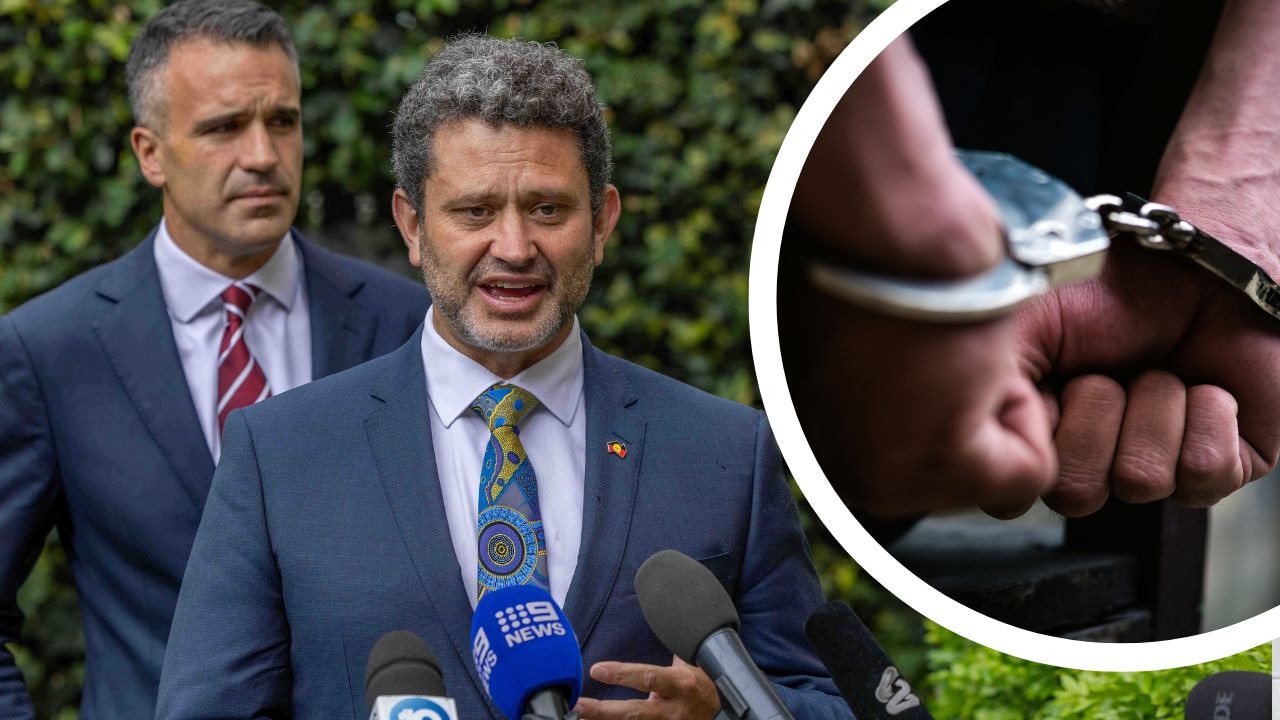Nine SA criminals blamed autism for their crimes: Expert says autistic community less likely to commit crime
Terrorists, pedophiles and violent offenders have “weaponised” ASD in court – a trend an expert warns is “demonising” Australia’s autistic community.
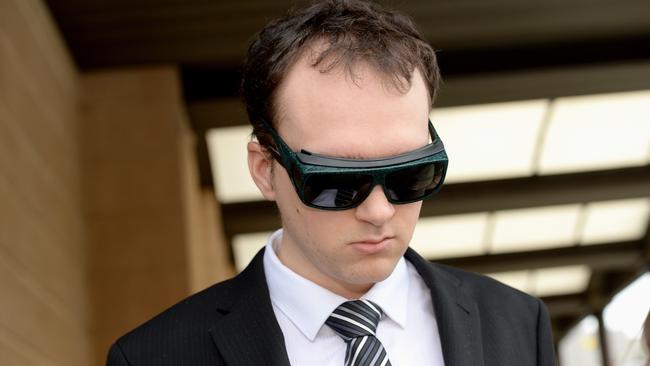
Police & Courts
Don't miss out on the headlines from Police & Courts. Followed categories will be added to My News.
Autism Spectrum Disorder has become a frequent topic in the state’s courts, invoked in cases ranging from child exploitation to domestic terrorism and violent extremism.
Yet it was not always this way – in fact, one of the first times it was raised resulted in a memorably firey declaration by a veteran judge.
In 2016, David Glen Cecchin – an accomplice to infamous Families SA pedophile Shannon McCoole – asked the District Court for mercy over his stash of child abuse material.
When his lawyer said Cecchin was “vulnerable” to viewing such material “due to his ASD diagnosis”, the late Judge Rosemary Davey was not having it.
“Not everyone who has Autism Spectrum Disorder is interested in child pornography,” she replied.
“I’ve no difficulty accepting he’s a vulnerable person, unfortunately the same can be said for 50 per cent of people I sentence.
“If you’re going to say his circumstances are so exceptional that I should reduce his sentence, you are on thin ice legally, and thin ice factually.
“He’s quite capable of communicating, it’s just that the material he communicates about is disgusting.”
SCROLL DOWN FOR EIGHT MORE CRIMINALS WHO BLAMED AUTISM FOR THEIR CRIMES
Cecchin, who was jailed for seven years, was among the first to raise ASD in court but far from the last.
In the past two years, The Advertiser has covered a further eight cases in which defendants sought to explain their crimes, or earn sentencing leniency, because of ASD.
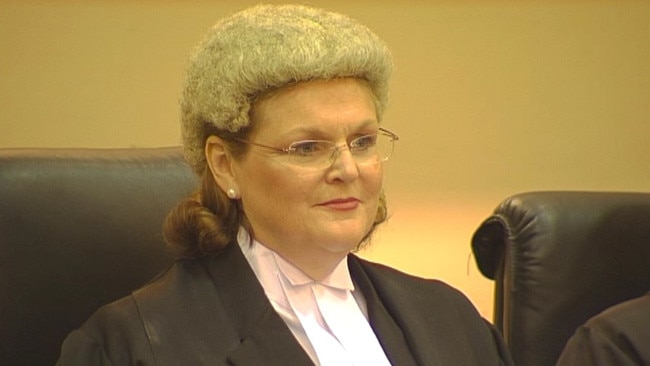
Professor Andrew Whitehouse, a professor of autism from the University of WA and the Telethon Kids Institute, said there was no dispute autistic people had committed crimes.
However, he said research showed they were less, not more, likely to commit “crimes of property damage, violent crimes or sexual crimes”.
He said any suggestion to the contrary was unsupported by scientific evidence.
“If anything, it’s the reverse – both observational and experimentational evidence has shown that autistic people are almost entirely faithful to a moral code even when it’s difficult to be,” he said.
“And while it’s true some autistic people may have challenges reading social cues, once they understand them they are highly empathetic toward people.”
Professor Whitehouse raised concerns over the reliance on autism as a mitigating factor in SA’s criminal courts.
“When people are making claims, the consequence of that is the (potential) demonising and marginalising of an already trod-upon group of people,” he said.
“Imagine being an autistic adolescent and seeing these excuses being put before a court … that can only be devastating.
“These are not the characteristics of somebody with a diagnosis of ASD, these are the characteristics of a criminal – and we need to make that distinctinction.”
SA’S NEO-NAZI CELL
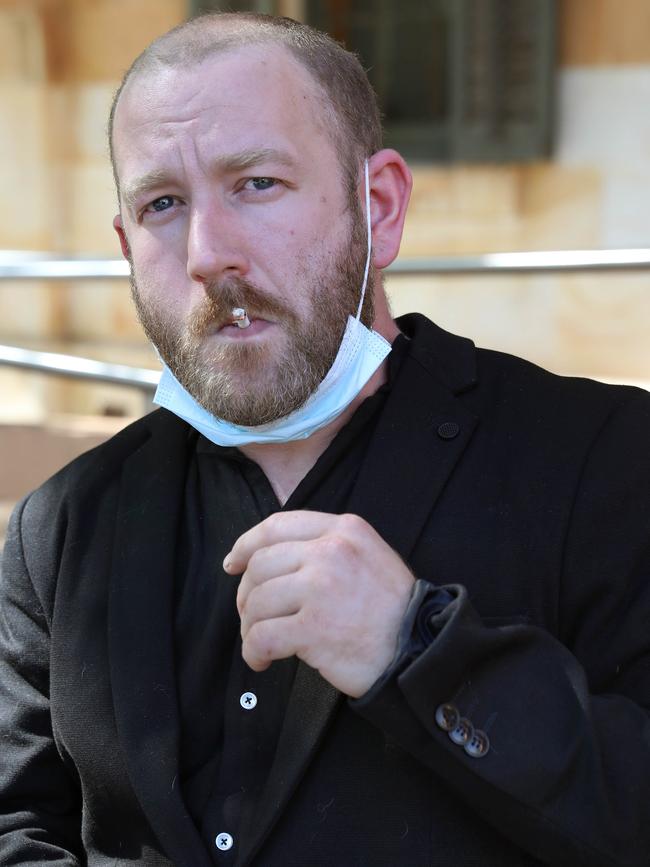

Exposing the state’s neo-Nazis and alt-right extremists brought hateful, pathetic and discredited rhetoric to light.
Two members of the SA Men’s Health Group – Patrick Patmore and Jackson Trevor Pay – argued their neurological conditions warranted merciful treatment.
Patmore, 34, of Munno Para, had spent eight years collecting bombs, bullets, knives, battle axes and manifestos of the world’s worst domestic terrorists.
He had a map of the state’s mosques and a handwritten note saying he and his peers were “not a social club – this is a revolutionary movement”.
Despite his ongoing membership of the National Socialist Network hate group, Patmore received a suspended sentence due, in part, to his “suspected, undiagnosed ASD”.
Pay – who, the court heard, was higher up in the Club than Patmore – fared more poorly.
His ASD, the court ruled, had resulted in “concrete thinking” that aided his radicalisation and fuelled his refusal to denounce his “abhorrent, disturbing and distasteful” ideology.
Pay had also described himself as “the best friend” of NSN leader Thomas Sewell and expressed his admiration for the “relatively bloodless revolutions” of Hitler and Mussolini.
He was jailed for more than 25 months, with the court ruling he remained a risk to the community.
TEEN TERRORIST
Between January 14 and March 16, 2022, a 15-year-old boy committed a string of terrorism and extremism offences from the bedroom of his suburban home.
Following his arrest, it would emerge he had been committing similar offences since the age of 14 – and had even sworn the Bay’ah to pledge his allegiance to Islamic State.
Time in youth detention only seemed to worsen the boy’s behaviour, as he used both a knife and a sharpened toothbrush to commit assaults behind bars.
He told case workers that, if released in time for Anzac Day 2023, he would “do something” – and referenced threats made on Dawn Services around the country.
Somehow, the boy even got his hands on a book commemorating the September 11 terror attacks while in custody.
In July this year, the now 16-year-old asked the District Court to impose a home detention sentence, arguing not a terrorist but merely “fixated” on extremism due to his ASD.
Judge Paul Muscat was not swayed.
“I do not accept that, I just do not accept that … he clearly has ASD, but that does not excuse or explain the offending behaviour (and) doesn’t mean he was not radicalised,” he said.
He will hear further sentencing submissions in September.
“PROUD PEDO BABE”
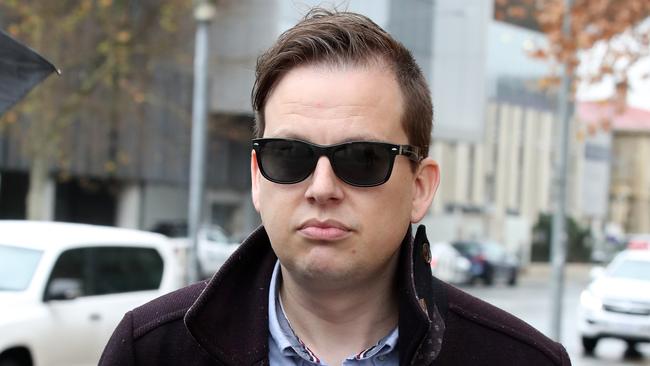
Prior to April 2021, Benjamin John Waters was a made man – having served as a Labor adviser both here and overseas, his political career was on the way up.
Then he was busted, by the state’s elite Joint Anti Child Exploitation Team (JACET) along with other members of an SA online sex abuse syndicate led by Jadd William Brooker.
He is awaiting sentence, having pleaded guilty to 182 offences against children and teenagers in Australia and around the world.
Waters pleaded guilty to accessing, transmitting and possessing child abuse material – but also tried to blame an ex-lover, a computer glitch and ASD for his offending.
He even denied having a sexual interest in children despite viewing exploitation material while at work and dubbing himself, in a chat log, a “proud pedo babe”
Prosecutors asked the court to reject it all, saying Waters had “weaponised his autism” to evade questioning and seek leniency.
Ultimately, Waters was jailed for eight months – but he was allowed to serve that sentence on home detention instead of inside a cell.
“ROCKING, REPETITIVE”
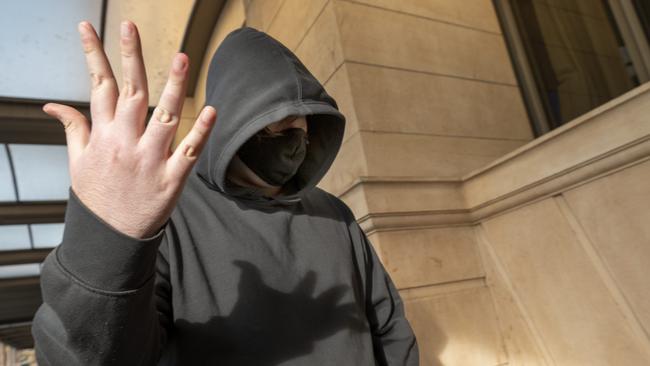
In August 2022, prosecutors urged the District Court to jail Whyalla teacher Nathan Fenwick for having groomed a vulnerable child for sex.
Like Cecchin’s case seven years earlier, that prompted a fiery response – this time from Judge Tim Heffernan.
“I don’t know if he’s sexually capable (of reoffending) but look at him – look at him,” he said as Fenwick, sitting in the dock, scrubbed his hands over his ears to block out sound.
“Every time this man has come before the court he has sat in the dock rocking, making repetitive motions, trying to prevent himself from being able to hear anything.
“He’s not a healthy individual, and he should not have been described as such in the prosecution submissions.”
A month later, however, the court heard expert evidence that Fenwick was “exaggerating” his symptoms because of a second, unrelated health condition.
In the end, Judge Heffernan ruled an autism diagnosis does not reduce one’s moral culpability for child sex offending and jailed Fenwick for 17 months.
THE LYING SPY

Former RAAF intelligence expert Sergeant Jacob Donald Walsh is Australia’s worst-ever child sex offender, having pleaded guilty to a record 230 offences.
Using false identities, he pressured 15 girls for sex online – even when they were ill or at risk of harm – and encouraged them to take prescription medication to become disinhibited.
The extent of his confession, however, was revealed in April 2023, when he asked the District Court for a lenient sentence on the basis of internet addiction, military secrecy and ASD.
His counsel, John Lyons, argued Walsh suffered post-traumatic stress due to his work, turned to the internet for respite, and became hooked on child exploitation due to his autism.
“He’s a very bright man but he has high-functioning autism … there’s quite a correlation between autism and the inability to appreciate the total extent of the gravity of one’s offending,” he said.
“Autistic people do have an inability to understand the feelings and morality of what they are doing to other people … it’s a sad ailment, something that swamps people.”
Prosecutors rejected those claims and, in June, said they could prove Walsh was lying about many things – thanks to his ex-wife.
The woman came forward, they said, after reading The Advertiser’s coverage of Walsh’s case including his false claims he had sought counselling for his issues and had her support.
She also revealed Walsh’s offending had started even earlier, when he spied on her adult daughter in the bathroom.
The District Court ruled Walsh’s crimes were deserving of 457 years’ jail but, as such a penalty cannot be imposed under SA law, sentenced him to 22 years behind bars.
As she imposed that term, Judge Joanne Tracey explicitly rejected Walsh’s plea for mercy on account of ASD.
“I accept the relevance of mental health diagnoses in sentencing, but they also must be weighed against the severity of offending,” she said.
“Here, that can only be described as brazen, shocking and devoid of any regard for the frailties and vulnerabilities of the children you abused so regularly and for so long.”
Walsh subsequently filed an appeal against his sentence, which has yet to be heard by the Court of Appeal.
MEXICAN “ART” FAN
From his home at Mount Compass, Benjamin Theo Cross sent thousands of dollars through the internet to Mexico to commission an artist for his work.
That work, the District Court heard in May 2023, was abhorrent child exploitation material – hundreds of animated images of children as young as seven suffering violence.
Cross went on to share those images with others, saying in chat logs he was “breaking the law in Australia everyday by being part of these servers”.
But after he was caught by the AFP in 2021, the 19-year-old told a psychologist he did not realise the images were illegal, while raising the issue of ASD.
Cross’ lawyer said his client had an irregular way of thinking because of his diagnosis and could not be held to the standards of a typical sex offender.
“What you have here is a man with a significant disability who had been drawing cartoons and making vulgar commentary about them,” his lawyer said.
Cross was sentenced to a suspended nine-month prison term.
ONE TRACK TO JAIL

Naim Louis Anderson was arrested at a train station as he waited to meet a teenager he was grooming for sex – not realising it was an undercover JACET officer.
The elite squad had been on Anderson’s trail for many months, and had even twice warned the 19-year-old to cease pestering girls across Australia and around the world for sex.
After Anderson pleaded guilty and, in mitigation, his lawyer argued those warnings fell on deaf ears because of his client’s “likely” ASD.
Anderson had been, he argued, “living in this fantasy land online” and needed a merciful sentence that would allow him to be diagnosed and rehabilitated in the community.
In June 2022, the District Court jailed Anderson for seven years – and in doing so, revealed his crimes were even worse than first known.
Judge Julie McIntyre revealed, in her sentencing remarks, Anderson had offered to pay a person to abuse a girl, 7, while he watched, and pressured them when they refused.
She also said Anderson’s numerous physical, mental and emotional disabilities “can only explain, not excuse” his crimes.




